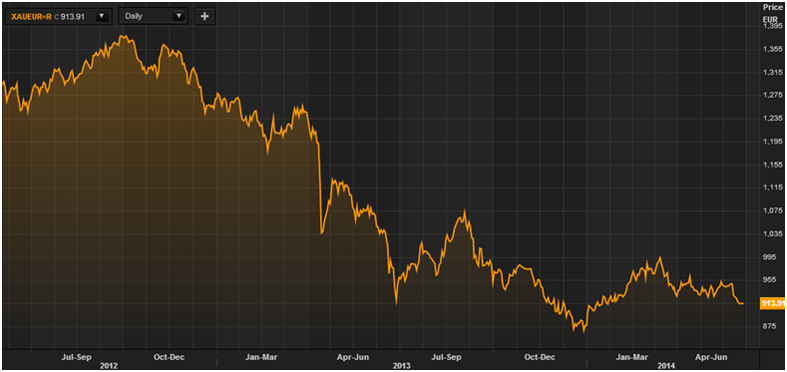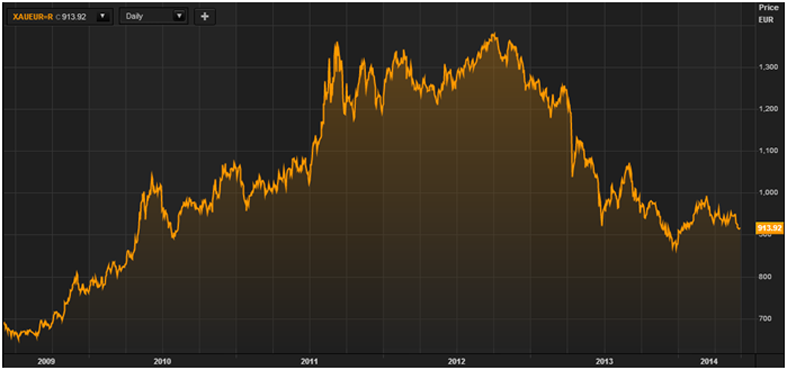-- Published: Thursday, 5 June 2014 | Print | Disqus
Today’s AM fix was USD 1,244.75, EUR 914.45 and GBP 742.69 per ounce.
Yesterday’s AM fix was USD 1,246.00, EUR 915.84 and GBP 744.73 per ounce.
Gold fell $2.60 or 0.21% yesterday to $1,243.70/oz. Silver dropped $0.03 or 0.16% to $18.81/oz.
Gold touched session highs near $1,250/oz yesterday and the dollar and U.S. stock index futures fell after the poor ADP jobs number. Soon after selling on the COMEX saw gold give up its safe haven bid. The poor ADP number may indicate tomorrow’s jobs number could also be weaker than expected.

Gold in Euros -2 Years - (Thomson Reuters)
Gold has now fallen for eight out of the last nine sessions and remains near a four month low in London amid poor sentiment. Overnight, Singapore gold traded in a tight range between $1,241.50/oz and $1,245/oz. Silver is a tad higher, platinum and palladium a tad weaker.
Gold prices are flat in London, ahead of a key European Central Bank decision and other significant economic developments due in the U.S. and internationally over the next two days.
Gold prices are holding just above $1,240/oz this morning for a third day. They are in a range between $1,240 and 1,250/oz after last week's decline. Spot gold's 14-day relative strength index (RSI) at 25.6 today is still indicating very oversold conditions.
The European Central Bank’s interest rate announcement is the main headliner today. Policy makers may push the deposit rate into negative territory for the first time and could launch other liquidity measures including some form of quantitative easing.
Investors later Thursday will look for a report on U.S. weekly unemployment claims and a reading on first-quarter household-debt growth. Friday, of course, brings the important U.S. nonfarm-payrolls report.
The European Central Bank is poised to impose negative interest rates on its overnight depositors, seeking to cajole banks into lending and to prevent the euro zone falling into Japan-like deflation.
The ECB will be the first of the "Big Four" central banks - ECB, Bank of England, Bank of Japan and U.S. Federal Reserve - to go the negative interest rate route, essentially charging banks to deposit with it.
The euro zone has been struggling with sluggish economic growth and depression era conditions in periphery nations. The ECB’s cheap money policies have completely failed to alleviate these brutal conditions. They are now doubling down on the monetary bet that further cheap money will lead to economic growth.

Gold in Euros -5 Years - (Thomson Reuters)
Dr Marc Faber told Bloomberg overnight that he thinks the ECB actions are “more important for Europe than for the American economy” and emerging markets.
“If Draghi eases massively than the euro will weaken and make Europe more competitive and if there is no easing at all than I would say the euro will continue to strengthen and the EU economies will continue to suffer”, Marc Faber said.
Faber is surprised that people would loan their money to the French government at 1.8%.
In answer to the question, “why in the world would anyone loan the French government money at that interest-rate?”, Faber says that that is a very good question. I own U.S. Treasuries at a 3% yield and people thought I was crazy.
“It’s part of a diversified portfolio” to purchase something that does not have anything to do with equities.
Faber was asked what would he do if he was Mario Draghi. Faber says that “if I were a Central Bank, I would be the greatest hawk in the world. I would squeeze the system like a lemon and bring inflation down to deflation, because deflation has some advantage for the majority of people. It's great if you have a strong currency and you have weak commodity prices so they can buy energy and transportation at lower costs.”
See Marc Faber’s recent interview regarding what he is going with his wealth here.
GoldCore Conclusion
Cheap money, financial repression and currency debasement are the classic recipe for short term financial and economic gains. Throughout history, they have been the easy options for emperors, kings, queens and governments. They are the easy option of central banks today.
However, throughout history currency printing and money debasement have never been a recipe for creating jobs and for long term sustainable economic growth and prosperity. Indeed, they inevitably lead to the general populace suffering the ravages of inflation.
The ramifications of today’s extreme ultra loose monetary policies, that are being seen internationally, are yet to be realised. Complacency abounds.
The ramifications of such extreme monetary policies such as, for the first time in history, negative interest rates are not being evaluated.
Will banks respond by beginning to charge savers an interest rate for their deposits? Savers, the backbone of the our capitalist system, are already suffering from negative real interest rates with bank deposits generally yielding less than government headline inflation in many countries.
Further financial repression, could be the ‘the last straw which breaks the laden camel's back.’
Indeed, it could lead desperate depositors to remove their cash from banks and deposit them in less risky banks internationally that offer a yield. It could also lead them to invest in safer assets that offer a yield such as AAA rated government and corporate bonds.
Gold has always been criticised as an investment due to it not yielding anything unlike some stocks and bonds. However, if banks charge an interest rate to keep cash in a savings account or current account then gold bullion becomes a much more appealing asset. Some depositors will rightly now see non yielding but safe haven gold as increasingly attractive.
| Digg This Article
-- Published: Thursday, 5 June 2014 | E-Mail | Print | Source: GoldSeek.com

